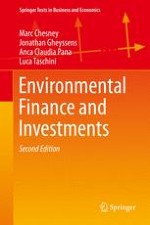2016 | OriginalPaper | Buchkapitel
5. Economic Growth and the Environment
verfasst von : Marc Chesney, Jonathan Gheyssens, Anca Claudia Pana, Luca Taschini
Erschienen in: Environmental Finance and Investments
Verlag: Springer Berlin Heidelberg
Aktivieren Sie unsere intelligente Suche, um passende Fachinhalte oder Patente zu finden.
Wählen Sie Textabschnitte aus um mit Künstlicher Intelligenz passenden Patente zu finden. powered by
Markieren Sie Textabschnitte, um KI-gestützt weitere passende Inhalte zu finden. powered by
